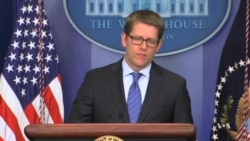WASHINGTON —
Events in Ukraine have reignited debate in Washington about President Barack Obama’s foreign policy and whether his administration suffers from a fundamental naïveté about the goals and motives of America’s adversaries.
Pointing to Syria’s ongoing civil war bloodbath, Iran’s nuclear ambitions, and Russia’s intervention in Ukraine, Republican lawmakers have criticized President Obama’s leadership on the world stage. Among those who took issue with his handling of global affairs was Senator Ted Cruz, who spoke on ABC’s This Week program.
“A critical reason for [Russian President Vladimir] Putin’s aggression has been President Obama’s weakness. [The administration’s] policy has been to alienate and abandon our friends,” said Cruz.
Expanding on the critique was House Intelligence Committee Chairman Mike Rogers, who also spoke on ABC’s This Week.
“Up to date, we thought it was a different century and the administration thought, ‘Well, if we just act nice, everyone will act nice with us.’ And that is just unfortunately not the way that [President] Putin and the Russian Federation see the rest of the world,” said Rogers.
White House Spokesman Jay Carney took issue with the criticism.
“There is an argument out there, factless, founded on no substantiated basis, that suggests that the president of Russia has taken the action that he’s taken because of actions the United States has taken. I think that any historian, anybody knowledgeable about Russia or the former Soviet Union, would be as dismissive of that suggestion as I am trying to be now,” said Carney.
President Obama should focus on the immediate situation in Ukraine, according to analyst Michael O’Hanlon of the Brookings Institution.
“I do not think he should worry, and I do not think he is inclined to worry, that this broader cacophony of criticism about his supposedly ‘feckless’ foreign policy needs to be proven wrong by how he reacts to Ukraine. The stakes are too high, and the potential for doing something really wrong is too high,” said he.
O’Hanlon describes the administration’s response to Ukraine as “fairly robust,” but adds stronger measures may be needed.
“If Russia were to launch some kind of a blatant assault against Ukraine, I think helping Ukraine’s military with various kinds of assistance should be seriously considered,” added O’Hanlon.
Russia says it is acting in Crimea to protect Russian nationals from what Moscow considers an illegitimate Ukrainian government.
Pointing to Syria’s ongoing civil war bloodbath, Iran’s nuclear ambitions, and Russia’s intervention in Ukraine, Republican lawmakers have criticized President Obama’s leadership on the world stage. Among those who took issue with his handling of global affairs was Senator Ted Cruz, who spoke on ABC’s This Week program.
“A critical reason for [Russian President Vladimir] Putin’s aggression has been President Obama’s weakness. [The administration’s] policy has been to alienate and abandon our friends,” said Cruz.
Expanding on the critique was House Intelligence Committee Chairman Mike Rogers, who also spoke on ABC’s This Week.
“Up to date, we thought it was a different century and the administration thought, ‘Well, if we just act nice, everyone will act nice with us.’ And that is just unfortunately not the way that [President] Putin and the Russian Federation see the rest of the world,” said Rogers.
White House Spokesman Jay Carney took issue with the criticism.
“There is an argument out there, factless, founded on no substantiated basis, that suggests that the president of Russia has taken the action that he’s taken because of actions the United States has taken. I think that any historian, anybody knowledgeable about Russia or the former Soviet Union, would be as dismissive of that suggestion as I am trying to be now,” said Carney.
President Obama should focus on the immediate situation in Ukraine, according to analyst Michael O’Hanlon of the Brookings Institution.
“I do not think he should worry, and I do not think he is inclined to worry, that this broader cacophony of criticism about his supposedly ‘feckless’ foreign policy needs to be proven wrong by how he reacts to Ukraine. The stakes are too high, and the potential for doing something really wrong is too high,” said he.
O’Hanlon describes the administration’s response to Ukraine as “fairly robust,” but adds stronger measures may be needed.
“If Russia were to launch some kind of a blatant assault against Ukraine, I think helping Ukraine’s military with various kinds of assistance should be seriously considered,” added O’Hanlon.
Russia says it is acting in Crimea to protect Russian nationals from what Moscow considers an illegitimate Ukrainian government.





